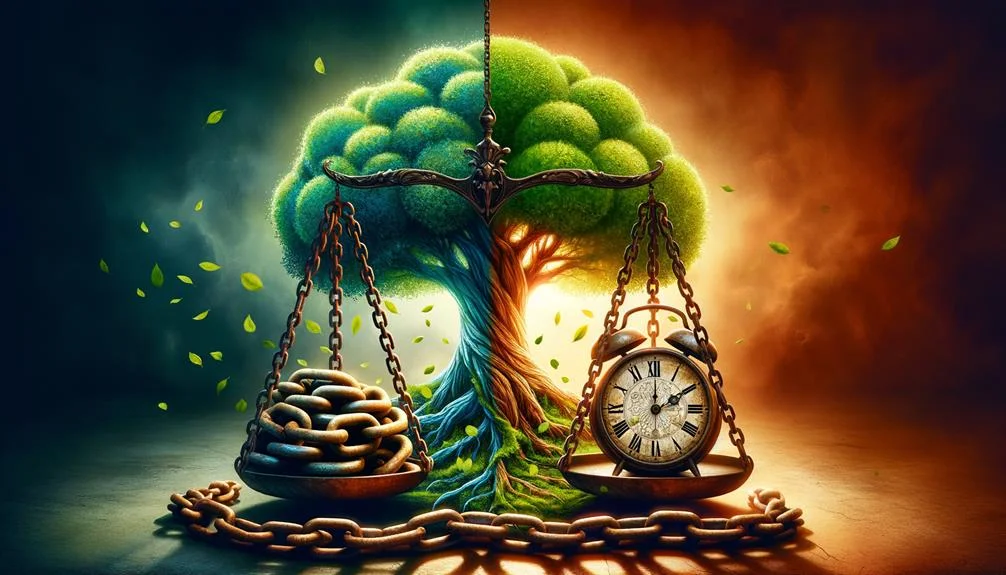Divided government enhances accountability and fosters bipartisan solutions, but can also hinder legislative progress and create uncertainty. It promotes transparency and prevents power concentration, leading to collaboration and public trust. However, partisan disagreements may cause gridlock and slow crucial legislation. The simultaneous benefits and challenges of divided government greatly impact governance and policy outcomes.
Takeaways
- Enhances accountability and transparency through checks and balances.
- Fosters bipartisan solutions to complex issues.
- Prevents concentration of power and extreme partisanship.
- Forces cooperation and communication between branches.
- Demonstrates a commitment to national interests and public trust.
Increased Checks and Balances
Enhancing checks and balances in a divided government system serves as a fundamental mechanism to prevent the concentration of power and promote accountability among branches of government. By having multiple branches with varying political compositions, each acts as a check on the others, ensuring that decisions are made through a process of negotiation and compromise rather than unilateral power grabs. This dynamic forces branches to justify their actions, fostering transparency and reducing the risk of corruption or abuse of power.
Furthermore, increased checks and balances necessitate cooperation and communication between branches to achieve policy goals. This collaboration can lead to more thoughtful and well-rounded legislation that considers a wider range of perspectives and interests. Additionally, the requirement for branches to work together can help bridge ideological divides and encourage bipartisan solutions to complex issues.
Potential for Gridlock
One significant drawback of divided government is the potential for gridlock, where legislative progress and decision-making can be hindered by partisan disagreements and competing agendas. When different political parties control different branches of government, reaching consensus on important issues can become challenging. Gridlock occurs when there is a stalemate in the legislative process, with each party being unwilling to compromise on their beliefs or priorities.
The potential for gridlock can lead to several negative consequences. First, it can result in a slowdown or even a halt in the passing of essential legislation, such as budgets, infrastructure bills, or healthcare reform. This can frustrate the public, as they expect their elected officials to work together for the greater good. Additionally, gridlock can create uncertainty in the political environment, affecting financial markets, business investments, and overall economic stability.
To mitigate gridlock, leaders from different parties must engage in constructive dialogue, prioritize the common good over partisan interests, and be willing to seek compromises. Overcoming gridlock requires strong leadership, effective communication, and a commitment to bipartisanship.
Encourages Bipartisanship
Encouraging bipartisanship in a divided government fosters collaboration and consensus-building among political parties for the benefit of the nation as a whole. When different parties share power, there is a heightened incentive to work together to pass legislation that addresses the needs of all citizens. Bipartisanship can lead to more thorough and well-rounded solutions as it requires compromise and negotiation between differing viewpoints.
Furthermore, promoting bipartisanship can help reduce extreme partisanship and polarization, fostering a more inclusive political environment. By finding common ground and working across party lines, lawmakers can demonstrate a commitment to putting the country's interests above partisan gain. This can enhance public trust in the government and lead to more stable and enduring policies that have broader support.
Challenges in Passing Legislation
Managing the complexities of passing legislation in a divided government poses significant challenges.
The impact of legislative gridlock can stall progress on vital issues, while the potential for bipartisan cooperation offers a glimmer of hope for effective governance.
These challenges have far-reaching implications for public policy decisions and the ability to address pressing societal needs.
Legislative Gridlock Impact
Amidst the dynamics of divided government, the impact of legislative gridlock manifests as a significant obstacle in the process of passing essential legislation. When the branches of government are controlled by different parties or ideologies, it often leads to challenges in advancing important laws and policies.
The following points highlight the key implications of legislative gridlock:
- Stalled Progress: Gridlock frequently results in the stalling of pivotal legislation, preventing timely solutions to pressing issues.
- Lack of Compromise: Partisan divides can lead to an unwillingness to compromise, hindering the negotiation process and impeding legislative advancements.
- Uncertainty for Stakeholders: Businesses, citizens, and other stakeholders face uncertainty due to the unpredictable nature of legislative outcomes.
- Diminished Public Trust: Prolonged gridlock erodes public trust in the government's ability to address critical matters effectively.
- Economic Impact: The delays caused by legislative gridlock can have adverse effects on the economy, affecting investments, job creation, and overall growth.
Addressing these challenges is essential to mitigate the negative consequences of legislative gridlock and foster a more productive legislative environment.
Bipartisan Cooperation Potential
Achieving bipartisan cooperation in passing legislation presents formidable challenges within the context of divided government. The fundamental divide between political parties can lead to significant hurdles in finding common ground and reaching consensus on key policy issues.
In a divided government where different parties control the executive and legislative branches, partisan interests often clash, making it difficult to advance legislation without bipartisan support.
One major challenge is the risk of gridlock, where competing party priorities result in legislative stalemates and an inability to pass pivotal bills. The need for compromise becomes essential in such scenarios, requiring both parties to set aside ideological differences and work together for the greater good of the country.
However, entrenched party positions and political polarization can hinder efforts to find middle ground and achieve bipartisan cooperation.
Furthermore, the pressure to adhere to party lines and satisfy partisan bases can impede the willingness of lawmakers to engage in bipartisan negotiations. Overcoming these challenges demands a commitment to dialogue, cooperation, and a shared goal of serving the public interest above party politics.
Public Policy Implications
The partisan divide in a divided government often results in significant challenges and complexities when it comes to addressing the public policy implications and passing essential legislation. This divide can lead to a range of obstacles that hinder the effective functioning of the government and the implementation of policies that benefit society as a whole.
- Gridlock: Disagreements between parties can lead to legislative gridlock, where essential bills get stuck in the process without making any progress.
- Compromise Difficulties: Finding common ground becomes increasingly challenging, as each party may have conflicting interests and ideologies.
- Policy Instability: The back-and-forth nature of passing legislation in a divided government can create uncertainty around policies, affecting businesses and citizens.
- Partisan Prioritization: Parties may prioritize pushing their own agenda over what is best for the country as a whole, leading to biased decision-making.
- Increased Polarization: Divided government can exacerbate political polarization, making it harder to achieve bipartisan solutions for the greater good.
Diverse Perspectives Considered
Considering the various viewpoints on divided government, how do differing perspectives impact governance and decision-making processes?
Diverse perspectives in divided government can both enrich and complicate the governance landscape. On one hand, diverse perspectives bring a wider range of ideas and solutions to the table, fostering creativity and innovation in policymaking. By incorporating viewpoints from multiple political parties, decision-makers can potentially create more balanced and thorough policies that address the concerns of a broader spectrum of the population.
However, these diverse perspectives can also lead to gridlock and inefficiency. When political parties have conflicting ideologies and priorities, reaching consensus on important legislation becomes challenging. This gridlock can stall progress, leaving critical issues unresolved and hindering effective governance. Additionally, the constant negotiation and compromise required in a divided government can sometimes result in watered-down policies that fail to fully address pressing societal needs.
Ultimately, while diverse perspectives can offer valuable insights and promote inclusivity, they also pose challenges that must be navigated carefully to ensure effective governance in a divided political landscape.
Impact on Policy Stability
Diverse perspectives in divided government not only influence decision-making processes but also have a significant impact on the stability of policies implemented. When it comes to policy stability, the dynamics of divided government can lead to both advantages and disadvantages:
- Increased Bipartisanship: Divided government may foster a greater need for collaboration between parties to guarantee policy implementation and longevity.
- Policy Gridlock: Conflicting ideologies and interests can result in challenges passing new legislation or making significant policy changes.
- Policy Reversals: Shifts in control between branches or parties can lead to frequent changes in policies, impacting stability.
- Delayed Decision-Making: Negotiations and compromises in divided government settings may prolong the time taken to reach decisions, affecting policy stability.
- Inconsistent Enforcement: Changes in leadership can result in inconsistent enforcement of policies, creating uncertainty for stakeholders.
Understanding these factors is vital in evaluating the overall impact of divided government on policy stability.
Frequently Asked Questions
How Does Divided Government Affect Political Compromise?
Divided government can impede political compromise by creating gridlock as opposing parties struggle to reach agreements. This can lead to legislative stagnation, hindering progress on important issues and potentially causing government inefficiency.
What Role Does Public Opinion Play in Divided Government?
Public opinion in divided government can sway legislative decisions, influence party strategies, and impact policymaking. Politicians often consider public sentiment to gauge support for their actions and adjust their approaches accordingly to maintain public approval.
Can Divided Government Lead to More Effective Policy Outcomes?
Divided government can lead to more effective policy outcomes by fostering compromise and bipartisanship. When different parties collaborate, diverse perspectives are considered, potentially resulting in well-rounded legislation that addresses a wider range of concerns.
How Does Divided Government Impact the Economy?
Divided government can impact the economy by creating challenges in passing legislation swiftly. Tensions between branches or parties may lead to gridlock, hindering the implementation of economic policies. Cooperation and compromise are essential for economic stability.
What Are the Long-Term Effects of Divided Government on Governance?
The long-term effects of divided government on governance can lead to challenges in policy implementation, as differing ideologies may result in gridlock. This can hinder progress on legislative agendas and potentially impact the effectiveness of governance.
Conclusion
To sum up, the divided government system offers increased checks and balances, encouraging bipartisanship and consideration of diverse perspectives. However, it also presents challenges in passing legislation and can lead to potential gridlock.
The impact on policy stability remains a key consideration in evaluating the overall effectiveness of this system. Ultimately, the pros and cons of divided government must be carefully weighed in order to determine its effectiveness in governing a democratic society.









